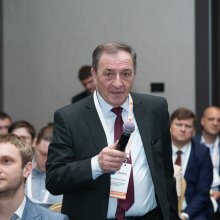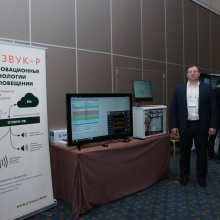About the event
Smart City: Reboot 2020
The 7th Federal Business Forum ‘Smart City & Region: Digital Technologies Paving Way To a Smart Country’ held in the Hilton St. Petersburg Expoforum Hotel on Feb.20, 2020 was a big success.
The event organized by ComNews Group gathered about 300 high-profile officials from the legislative and executive government in Russian cities and regions, government institutions, federal telecommunication service providers, IT companies, suppliers of ICT solutions, system integrators and digital service developers.
Smart City & Region Forum was endorsed by the Administration of the Governor of St. Petersburg, the ICT Committee of St. Petersburg; Administration of Tambov region; the Government of Crimea Republic; Administration of Nizhni Novgorod; Ruselectronics Holding (Rostec State Corporation), Rusatom Infrastructure Solutions; SEZ “Innopolis”, ITMO University, the National Center for Cognitive Technologies ITMO University; RUSSOFT Partnership; IoT Association, Digital Era of Transport Association; the St. Petersburg Technopark; SPb CIO Club; Central Federal District CIO Club, International Academy of Communications.
Platinum Sponsor of the Forum in St. Petersburg was MTS, while LANIT-Integration was Silver Sponsor. National operator Rostelecom was Partner of the Forum, MegaFon was Innovations Partner; and ER-Telecom was IoT Partner. Data East, Schneider Electric, Computational Solutions JSC, Arrow Electronics, Avtomatika Concern (Rostec Group), SearchInform were Session Sponsors. The Forum was supported by Etton Group, Smart Media Systems, and Edge Vision. OS Group, Otzvuk and Kaspersky Lab presented their solutions as General Exponents.
The Plenary session was moderated by General Director – Editor-in-Chief of ComNews Group Leonid Konik. The first part of the session consisted of cities sharing their best Smart City practices and reviewing the preliminary results. Deputy Head of ‘Smart St. Petersburg’ Project Office and Special Envoy of the Governor of St. Petersburg for Economic Development Anatoliy Kotov spoke about regional developments. “Lack of single databases and verification systems is a major barrier for the digital economy. It will be very difficult to take things forward unless we address this issue,” he said.
A representative of Sarov City Administration Evgeniy Shikhanov told about the single information platform implemented across all of Rosatom’s Smart Cities. Head of Nytveno Municipal district (Perm) Rinat Khaertdinov told the audience about a unique social Smart City solution implemented in Perm region.
The second half of the Plenary Session featured speakers from state corporations and companies, widely engaged in Smart City projects. Ruselectronics’ Director of Center of Competences ‘Smart City – Digital Region’ Oleg Izvekov pointed out that whatever we think of the project ‘Smart City’ developed by Russian Ministry of Construction – it is criticized a lot and often for good reason, there is one undeniable plus point to this project – that the regional authorities have finally joined the dialogue about Smart City projects using the language they know best – regulations.
MTS’ Director of М2М/IoT Department Sergey Irevli gave an overview of Smart City eco-systems: IoT, Big Data, 5G. The most important topic in the implementation of Smart City projects is scaling them into other regions. Olga Patrievskaya, Head of the Department of Big Data and Machine Learning of the St. Petersburg Information and Analysis Center, shared on scaling. Rostelecom’s Director of Applied Projects Department, Macroregional Branch North-West Elena Polyakova entitled her presentation “On the path towards a Digital Region”. Pavel Kondakov, LANIT-Integration’s Managing Director of the Center for Strategic Development and Digital Transformation, spoke about the role of Regional Control Centers. ER-Telecom’s Deputy Director of B2G Alexey Palamarchuk presented an overview of applied solutions for Smart City and cases of their implementation. MegaFon’s Digital Projects Director Anton Artemyev spoke about innovations and complex solutions for a digital region.
The plenary session concluded with a panel discussion dedicated to the existing chаllenges and new ways to take the Smart City concept forward. Panelists included: Anatoliy Kotov, Oleg Izvekov, Elena Polyakova, Olga Patrievskaya, Sergey Irevli, and also Territorial Manager from the the Technology unit of Sberbank North-West Viktor Puchkov and Chairman of ТC-194 “Cyber-physical systems” and Head of Programs at the Russian Venture Company Nikita Utkin.
In the course of discussion, panelists agreed that at this stage of Smart City concept, which is supposed to evolve into Digital Region and, eventually, Smart Country, standards are becoming a critical tool for market players and other stakeholders. It is evident, that eventually those who will take part in the elaboration of Smart City standards, will be in a better position compared with their competitors. However, the future of the regulatory framework for Smart City developed by the Ministry of Construction (MoC) and the pilot projects (about a hundred in total), admitted into the MoC’s ‘Smart City’ program according to the existing regulations, is still an open question.
Following the plenary discussion the floor was given to General Exponents. Dmitriy Zuev, Commercial Director of OS Group, Roman Ostankov – CEO of Otzvuk and Dmitriy Mityushin – Business Development Manager from Kaspersky Lab offered blitz presentations of their respective solutions.
Session А dedicated to digital transformation of the utilities and public housing sector and innovative technologies for city utilities was moderated by Egor Chemodanov, Project Manager, Department of IT Support, St. Petersburg water service company (Vodokanal). Maryana Klimchuk from MTS’ IT solutions team in St. Petersburg spoke about innovative technologies for municipal utilities. Oleg Schwarz from Data East told the audience about the domestic cloud geo-information system for municipalities. Natalia Deyanova, VP Marketing and Digital Experience of Schneider Electric, entitled her presentation: “The Energy for Smart City”. Grigoriy Pugaev, Etton’s Commercial Director, spoke about an innovative waste management system based on end-to-end digital wireless technologies and Big Data. Ivan Vasilyev, Senior Manager of Utilities Division, Computational Solutions JSC, looked into the issue of transparency in the utilities sector. Alexey Ivanov, Project Manager at Smart Media Systems, spoke on how geo-information systems can help with Smart City tasks. Dmitriy Kirilkin, Smart City IoT Product Manager at MegaFon, offered an insight into a digital eco-system for management companies.
Session B featured complex projects and new approaches to smart transport systems. The session was moderated by Anton Zhuravlev, President of the Association ‘Digital Era of Transport’, and Timofey Volotskiy, Chief of Optimal Transport Systems Lab of the ITMO University.
Sergey Saakyan, Advisor to Director for Regional Activities of MosTransProekt, spoke about an integrated ITS system. Sergey Zaychenkov, Deputy Director for Development, St. Petersburg’s Road Traffic Directorate, offered an overview of smart transport system for St. Petersburg. Pavel Adatich, Head of the Regional Center for Transport Control, spoke about the automated system behind their organization. Lyubava Taneeva, LANIT-Integration’s Business Development Director, spoke about the strategy of a comprehensive solution for transport problems and development of a smart transport system for the city. Mikhail Kozhukhovskiy from Automatika Concern (Rostec) presented a state-of-the-art module-based approach to building intelligent transport systems in the regions based on service platform TRANSFLOW : 2020-2024. At the junction of national programs BKAD and ‘Digital Economy’. Dmitriy Vasilenko, Senior Engineer and head of Analog Devices at Arrow Electronics, spoke about solutions using a time-of-flight camera to count passengers. Maxim Sokolov, Edge Visionn’s CTO, presented a solution for transport flow analysis based on computer vision. Vladimir Shepelev, motor transport researcher from the Institute of Engineering and Technology of the South Ural State University, entitled his presentation: “Monitoring of road traffic and road-transport infrastructure using neural networks”.
The next case-session was dedicated to exploring efficient funding models for Smart City projects and possibilities for Big Data opened by digital projects. Peter Bjørn Larsen, founder and director of Smart City Insights ApS (former Director of City Data Exchange, Copenhagen (2015-2017) presented an overview of global Smart City practices. Larisa Tatarova, manager of the product “Digital Copy of the Region”, MTS, spoke on how a digital model can help boost the efficiency of regional administration. Georgiy Minayan, Security Director of SearchInform looked into the issues of safety and security of personal and municipal data. Rais Khadeev, Innopolis’ Head of Development of Potential and Cooperation between Resident Companies and Partners, delivered a presentation entitled: “Consortiums between Vendors of Solutions and Data Sharing Economy for a Smart City on the example of Innopolis”.
The forum concluded with a round table discussion about the role of standards for Smart City projects, and namely, the new Smart City standard TC-194. The session was moderated by Andrey Chugunov, Director of the Center of E-Government Technologies, Institute of Design and Urban Studies, ITMO University. Panelists included: Nikita Utkin, Chairman TC-194 “Cyber-physical systems” and head of programs at the Russian Venture Company; Sergey Mityagin, Director of the Institute of Design and Urban Studies, ITMO University and head of the international research project “Smart City St. Petersburg”; Filipp Dubovik, Senior Lawyer, Intellectual property, IT and Telecom Practices, DENTONS St. Petersburg; Pyotr Ivanov, Advisor to the Director of SPb IAC; Gennadiy Orlov, Digital Healthcare Projects Manager, PRIOR North-West; Vitaliy Krukovskiy, Deputy CEO for municipal infrastructure, SevStar; Igor Khodachev, Head of Research, North-Western Institute of Administration, The Russian Presidential Academy of National Economy and Public Administration.
Panelists agreed that standardization of Smart City market from top to bottom, through directives, is hardly the most efficient way forward. Nevertheless, the industry also has questions to TK-194's approach. How the TK-194 based standards will coexist with the regulatory requirements put in place by the Ministry of Construction isn't clear at this point either, especially given that standards don’t have mandatory power in Russia, they only serve as guidelines.
Smart City & Region 2020 demonstrated the importance of a dialogue between government and business and became a valued platform to exchange opinions on such crucial matters as Smart City standards, possibilities of scaling Smart City solutions; best practice exchange between regions; funding for Smart City projects; digital transformation of municipal transport and ulities; comprehensive assessment of innovations implemented in cities and regions.







